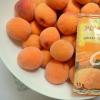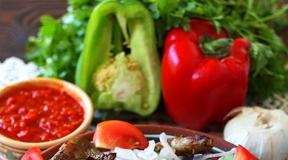Clandestine salad production workshop. Salad shop in detail
* Calculations are based on average data for Russia
Food services are rightfully considered one of the most promising in business, because the need for food is one of the first human needs, and he will satisfy it regardless of other factors and situations. Therefore, a business idea based on providing food to the population is always relevant and can be a good start. One of the directions is creation ready-made salads, they are quite in demand among the common population and especially among office workers who need cheap and simple food that can be consumed on their lunch break.
The market situation is such that in any large city there are already companies that are engaged in the production and sale of ready-made salads. In small settlements, it is often not always possible to find such an offer, moreover, a ready-made salad is inherently a perishable product, the optimal shelf life is up to 36 hours, after which the product must be removed from sale. In this regard, the company can work only within a small area, transportation to other settlements not only increases the cost of production, but also takes a lot of time, which is critical in this case. But even in a big city, where more than one competitor is already working, there is a chance to take its place in the market. After all, the consumer needs a sufficient range of products, and not every company offers large menu Moreover, most manufacturers produce 5-10 positions, and some even less.
Of course, it is impossible to reach all consumers with such a proposal, although a significant part of people prefer classic salads, which every self-respecting company has in production. However, a beginner can get competitive advantage different ways, the simplest is to reduce the price, at least for the first time, while there is a need to enter the market. An important indicator is the quality of salads, it is not always possible to find really tasty product, which at the same time is distinguished by safety for health. The manufacturer may add preservatives to their salads to increase shelf life, but they are not always harmful to the end consumer.
You should also take into account the fact that the appearance of a new player is complicated by the need to obtain a large number permits from government agencies, moreover, subsequently you have to undergo constant checks by regulatory organizations. All this also applies to an entrepreneur who has already entered the market and is trying to develop, but not everyone knows how to cope with difficulties, and the provision of catering services is still not the easiest thing. Therefore, having studied the market and the positions of competitors, you can find the optimal way of your development, while sometimes it will even be possible to coexist with other manufacturers on the same territory, offering, for example, completely different menu and thus attracting completely different consumers.
To get started, you need to register as a business entity. If you plan to open an enterprise with small volume production, the owner of which will be only the businessman himself, he can, for ease of registration and reduce his costs, take shape as an individual entrepreneur. The advantage of this form and in a simple reporting procedure is that an individual entrepreneur can dispose of the proceeds, he is deprived of the need to pay wages to himself, as it happens within a legal entity. But if, nevertheless, there is a need to register a legal entity, then it is better to choose the form of a limited liability company. Both individual entrepreneurs and LLCs have the right to use the simplified taxation system, transferring to the state no more than 6% of income or 15% of operating profit. This activity falls within the definition of (OKPD 2) 56.29 Other catering services, although other classifiers may be selected depending on the format of their activities.
Ready-made ideas for your business
However, after registration, some difficulties begin, because to open your own enterprise, which is engaged in the production food products, you need to get more than one permission. In fact, the enterprise must pass compliance for compliance with sanitary standards, with this request you need to contact the local department of Rospotrebnadzor. All food industry today takes into account the requirements of the technical regulations of the Customs Union, but in the case of working with only salads alone, you can get by with a notification to the regulatory authorities about the opening of your production. There are also technical conditions(TU) for salads, but not available state standards, and they must be taken into account when creating products. The products undergo an examination, and here it is better to create a menu entirely from the beginning, including dishes that are not planned to be produced at first, but in the future. This is necessary in order to obtain a general opinion on all products and not to undergo re-examination.
Next, you need to obtain a sanitary and epidemiological permit, which is issued only if the enterprise complies with all norms and rules. This includes all the natural requirements for maintaining cleanliness, conducting deratization and disinfection measures, but also requirements for the separation of technical zones may be put forward. That is, the kitchen itself, refrigerators compartment, the washing unit and other rooms must be separated from each other. It is necessary to find a company that will deal with waste disposal and, of course, it is necessary to ensure complete fire safety. Only an organization that meets all the requirements can obtain all permits and legally engage in its activities.
The entrepreneur also needs to think about taking measures for labor protection, because employees and entrepreneurs in the food industry are checked especially carefully. And finally, it should be noted that each region of this country may have its own requirements from the regulatory authorities, sometimes significantly different from the general ones. Therefore, the best solution to this issue is to contact your local regulatory authorities as soon as possible and immediately collect all information about the requirements and conditions.
You can also contact specialized companies that provide assistance in obtaining a particular document, but in this case you need to count on additional expenses. This issue is perhaps the most important at the stage of organization, without its decision it will not be possible to engage in its activities, sooner or later a company that operates illegally will be discovered, and the entrepreneur, in the most favorable case, will get off with a large fine.
Ready-made ideas for your business
This is followed by a search for a place for your production. Here you need to look for a place that is convenient for subsequent delivery finished products to the point of sale. Some entrepreneurs open some semblance of a canteen, launching a small production in a crowded area and selling salads directly at retail, but this format of work has some drawbacks, the most important of which is the lack of development and a deliberately small number of consumers. That is, this option is suitable only for those who wish to engage in small production. Salads are usually sold in bulk to retailers. Thus, the entrepreneur himself determines the place where it will be convenient for him to work, and then to deliver the goods, many start such a business almost at home, erecting industrial premises on your own site.
However, it is hardly possible to work only in one's own kitchen, in this case the main thing will not be - large volumes of production, and competitors will easily bypass the entrepreneur. Such a format of work, when a businessman and his family make salads themselves and deliver them to shops, may be relevant only in some small towns, but in general it has already outlived its usefulness.
The room itself can be of different sizes, but it directly affects the possible volume of production. Most the best way- rent a canteen, which is no longer working, possibly of the Soviet era, because in this case, the premises will be transferred to the disposal, originally designed for the production of food and divided among themselves according to all the rules. But for large production volumes, a sufficiently large workshop will be required, which can occupy more than 100 square meters, in such an area it is possible to produce several tons of salads every month, and it is precisely such sales volumes that can make such a business highly profitable.
You also need to allocate space for a warehouse complex, but first of all, a warehouse is needed for raw materials, but not for finished products, it must be immediately delivered to retail outlets, only in this case you can achieve a quick turnover of your funds. Delaying finished products at the warehouse leads to costs, so you also need to take care of organizing your own fleet. Vehicle because not every retailer will be able to pick up the goods directly from the factory. Moreover, not a single retailer, except perhaps a very large one, will want to cooperate with a company that cannot supply it with its own products. Therefore, the territory of its complex can occupy a plot of several hundred square meters, and for the organization of such a production it will be necessary to allocate several million rubles. Of course, a small production can be opened for a couple of hundred thousand rubles, but in this case, it is assumed that mainly manual labor will be used, which affects the volume of products supplied.
In this regard, today, full-fledged lines for the production of ready-made salads have already been developed. They themselves represent several machines that perform almost all processes - from cleaning vegetables and cooking and frying them to cutting and mixing and then placing them in a designated container. The cost of such a line can vary greatly depending on the configuration, the calculated loads and the manufacturer, the most expensive are European cars, the cheapest are Chinese and Russian devices, and the difference for completely similar products can be several times. The manufacturer usually supports the possibility of individual selection of a complete set of the line, so that it is possible to assemble devices that are necessary only for their own production. However, it should be borne in mind that a production line is almost always assembled only to order, which means that it takes time to manufacture, deliver and install it. The cost of such equipment starts from about 100 thousand rubles per car, washing baths and some other auxiliary devices are cheaper.
Ready-made ideas for your business
Refrigeration equipment is purchased separately, a room of considerable size is allocated for the refrigeration warehouse, and it should be located in the immediate vicinity of the production. Refrigeration equipment is purchased in our own truck, on which the delivery of goods to retail outlets will take place. It is better to start purchasing equipment only after receiving information about the requirements of Rospotrebnadzor and other inspection bodies, because then it will be possible to assemble only those machines that meet these requirements. As a result, the cost of the line itself, its transportation and installation will cost several hundred thousand rubles or even millions, the amount varies depending on the configuration, so sometimes there is an opportunity to save money, but for large volumes and a normal product range, a significant amount of investment is required.
The next question is personnel. Usually, an enterprise in this industry, despite its apparent complexity, does not employ too many people. If the process is automated, then only a few operators are needed to monitor the equipment, load raw materials and control the process. Manual labor is usually minimal here, although there are machines that only work with refined or heat-treated products. However, if a home production opens, where all the equipment is a food processor, knives and other kitchenware then it may take a lot of people to fast creation the right amount of salads.
We must not forget that all employees who are directly involved in production process, that is, they deal with vegetables and other products, must have health books and work only in special form... Hygiene comes first.
Drivers will be needed for transport. The rest of the employees are engaged in administrative and organizational work, special attention should be paid to sales representatives who will find new points of sale for products and promote them among merchants. However, at first all these issues will almost certainly be dealt with by the entrepreneur himself, because at first there should not be too many products, which means that it is not difficult to cope with such work alone.
All other business processes that are not related to making a profit by the organization should be outsourced. This is the already mentioned labor protection, bookkeeping, security and safety, garbage disposal and cleaning of the territory and premises. You will almost certainly have to cooperate with big amount third-party organizations, but this significantly reduces costs.
Usually, in such a business, the product reaches the end consumer, bypassing only one intermediary. That is, the manufacturer transfers the product to the retailer, and the final consumers buy the salads from him. Sometimes a wholesale intermediary is added to this chain, which works with retail, purchasing a large batch of goods from the manufacturer. As already noted, it is usually not advisable to engage in retail sales on its own, that is, the manufacturer must find enough partners. Even ordinary ones will become them grocery stores, in which the usual and simple salads common people often buy.
If a point is located near large offices or just in business districts, then a significant part of the office workers will buy salads during their breaks, this applies to those who cannot afford lunch in a cafe or restaurant. You can even try to go out to canteens in businesses and even entrepreneurs who offer hot meals right in the office. If they do not have any salads on the menu, then you can agree on cooperation.
But where you almost certainly won't be able to get through is to large retail chains. Usually, such large players have been producing salads on their own for a long time; in hypermarkets, the kitchen is organized right there, which allows customers to purchase as much as possible fresh product... However, even in this case, the distribution network is sufficient to sell all its products without experiencing serious problems due to the impossibility of cooperation with hypermarkets.
It should also be noted that in this business, a certain percentage of products sold will be returned, because a rare outlet will agree to suffer losses due to products not sold due to a short shelf life. Sometimes this figure can reach 10%.
The profitability of large-scale production is about 10-15%, the payback period can be up to 2-3 years. Home production, if it turns out to be relevant, usually pays off in a few months, and the profitability is many times higher, but there are no prospects if you do not invest serious funds in development. Such a business can be expanded through the subsequent creation ready meals, which you can simply warm up and get already meat dishes with a side dish. But this is a slightly more complex production.
Matthias Laudanum
340 people are studying this business today.
For 30 days, 113784 times were interested in this business.
Calculator for calculating the profitability of this business
rent + salaries + utilities, etc. rub.

On average, the cultivation of one hectare of beetroot costs 30-40 thousand rubles. The cost of a product is influenced by the availability of agricultural technology, the cost of labor in the growing region, and weather conditions.

To get a full-fledged garden, you need 2 thousand seedlings on five hectares. The cost of a cherry seedling is about 300 rubles, but a cherry can cost 700 rubles. If we take an average price equal to ...

The cost of apricot seedlings is 700 rubles; more than four hundred plants can be placed on one hectare (at the rate of 24 m2 per tree). Even if we take into account only 400 plants, then ...

A greenery for sale business does not require a lot of start-up capital. The demand for such products is stable, and the profitability of such a business is over 65%. The key problem is the organ ...
High profitability and demand attract new investors to the salad market. This market is growing at a gigantic pace. According to some estimates, its growth is 25% per year and this trend will continue in the future. Today, the annual turnover of the salad market is estimated at $ 400 million, and this is not the limit. Jae in Moscow, he is far from saturation, not to mention the provinces.
Benefits of the salad business:
Uncomplicated technologies, affordable price entrance
High profitability
Fast turnover
Constantly growing market
Ability to master related formats
The main consumers of salads are working women, bachelors and office workers. By the way, the latter joined target group salad bowls recently. And this trend was caught on time by several manufacturers at once.
Today, 90% of all salad producers do not sell their products directly, but through retail outlets and chains. However, not everyone can become a supplier to a large retailer: the manufacturer's assortment should include several dozen product options. High Quality... But a novice manufacturer can offer their products to small shops in the districts. Such cooperation is beneficial for the latter, since the presence of salads in the assortment increases the number of customers of the store.
In addition, specialty grocery stores regularly appear on the market, which willingly work with suppliers.
Hundreds of new manufacturers enter the market every year - some survive and some fail. According to experts, success lies in the successful format of a new enterprise. One of the recent successful proposals is the production of dishes to order for banquets, buffets, presentations and just for home feasts. This business is mainly carried out by companies that have organized production in canteens of schools, kindergartens, etc.
As for the assortment, despite the obvious abundance of supply, the most stable demand is for the classic “folk favorites”: “herring under a fur coat”, “mimosa” and “olivier” (40% of sales). korean cabbage carrot (25%).
The fresh salad market is conventionally divided into three segments. The first includes semi-finished products from fresh cut vegetables, without preservatives and freezing, as well as mixtures of them.
The second group - ready-made salads from fresh and boiled vegetables using dressings: mayonnaise, oil, vinegar and spices.
Finally, the third group is Korean salads.
The profitability of salad production in Moscow is around 40%. In the regions, it does not go beyond 15% on average: both production volumes and demand for expensive salads are less.
In many ways, the amount of profit depends on the season.
The fact is that Russian agricultural enterprises cannot all year round provide salad producers with fresh vegetables, so you have to buy imported vegetables, which are much more expensive. Affects profitability and the buyer's ability to correctly determine the quality of raw materials.
Manufacturers are insured against the supply of low-quality raw materials in various ways. For example, it can be a preliminary purchase of a small batch of vegetables "for trial". Or hiring an experienced supplier.
The profitability also depends on the cost of the products used to prepare the dish. For example, the high up to 60-70% cost of seafood salads falls on expensive ingredients - mussels, squid, crabs. But their consumers are wealthy people who are ready to buy them at high prices, from 25 rubles per 100 grams.
Salad sales are subject to seasonal fluctuations.
Winter is the “high season” for suppliers of ready-made salads. In the summer, there is a natural decline in consumer activity: people go on vacation, and complex salads traditionally give way to fresh vegetables. But with the onset of cold weather, whole lines of people wishing to buy their favorite snack line up in the departments of ready-made salads. Sharp spikes in sales are observed before the holidays, especially New Years, and during periods of religious
ny posts.
Meanwhile, supermarkets are constantly increasing not only purchases of finished products "on the side" and the staff of their sales departments, but also their own production. And although from a financial point of view it is more profitable for stores to cooperate with manufacturers of ready-made salads, nevertheless, many try to do on their own so as not to worry about the quality. From the point of view of retailers, it is most profitable for them to make salads from expensive ingredients (for example, seafood, giving 60 percent or more profitability) in the store itself. In addition, what to hide - here, withered carrots, "dull" cabbage, "hovering" lot of beets successfully go under the knife.
That's why when large networks began to organize their own production, "salad bowls" inevitably have to open and master new niches. They have to retrain involuntarily. So, the popular company "Soller", decided to create new brand for consumers with high and middle income. And now produces wedding and anniversary cakes, and also starts the construction of a whole chain of elite cafes-pastry shops under the Doucet X.O.
The company "Velikoross" is today the owner of a new, already well-known brand "Crystal Snowflake": in hexagonal packages, the company sells traditional jellies and jellies prepared according to old recipes national Russian cuisine.
The Savon-K company has decided to develop a new direction - the preparation of "first courses". Now she has 20 quick frozen soups(borscht, cabbage soup with mushrooms, sturgeon soup, Thai soup and pickle with squid meatballs) and a similar number of "popular" salads.
Finally, some enterprising manufacturers have successfully exploited interest in Japanese cuisine and offer their consumers fashionable and popular nowadays sushi.
Experts advise against entering this market today with minimal investment. The lower limit is a small workshop with a capacity of 100 kilograms of salads per day. The minimum set of equipment, as well as obtaining permits from the sanitary services and the consumer market committee, will cost the entrepreneur 10-15 thousand dollars. Most of the operations in such shops are done manually.
The sanitary services impose very strict requirements on the organization of the salad shop. It is best to organize production in the former food production x or in the premises of canteens. It is imperative to certify the workshop and dishes prepared according to original recipes... As practice shows, it takes about $ 500 and three months of "paperwork" to approve a list of recipes of 10-15 dishes.
The organization of a more powerful workshop with a capacity of 200 kilograms per hour will require about 200 thousand dollars. True, you can save money and purchase a domestic-made IPKS-0610 complex worth 400 thousand rubles, which includes everything you need for cooking (from cleaning vegetables to cooking, filling, etc.) and packing in plastic trays. True, many manufacturers still prefer imported equipment, which is much more expensive: only one vegetable cutter costs 25 thousand euros.
Tips for beginners
Logistics problems. The term for the sale of salads is 36 hours, you need to deliver every morning to outlets, so if you have delivery today at 7:00, tomorrow at 17:00 you have to remove the goods from the window. For this reason, the workshop works mainly in two or three shifts.
Lots of manual labor such as cleaning boiled eggs, eyes on potatoes, etc.
The staff, with the exception of handymen, must have medical records and a specialized profession.
There is another important factor that you will probably have to face - a possible conflict between your workshop and stores. Returns - 3-10% of all deliveries, losses - at the expense of the manufacturer.
Salad shop in detail
Productivity - 5-6 tons of salads per month
Initial investment - 120 thousand dollars (purchase of equipment, refrigerators, the first batch of raw materials, rental of premises, paperwork)
Gross proceeds - 23 thousand dollars
Monthly expenses- 12 thousand dollars
Income - 11 thousand dollars
Payback period of investments - 1.5-2 years
Account (Percentage, wed. Per month)
Gross revenue - 100.0
Expenses - 56.6
Including:
- for renting premises - 5.4
- for the purchase of vegetables and other ingredients - 36.2
- for staff salaries (10 people) - 8.3
- for utilities - 1.2
- for waste disposal - 1.1
- for technical needs - 0.4
- for transportation costs - 4.0
Income (excluding taxes) - 43.4
Based on materials from Business magazine and magazine Svoy business
* Calculations are based on average data for Russia
Food services are rightfully considered one of the most promising in business, because the need for food is one of the first human needs, and he will satisfy it regardless of other factors and situations. Therefore, a business idea based on providing food to the population is always relevant and can be a good start. One of the directions is the creation of ready-made salads, they are quite in demand among the common population and especially among office workers who need cheap and simple food that can be consumed during their lunch break.
The market situation is such that in any large city there are already companies that are engaged in the production and sale of ready-made salads. In small settlements, it is often not always possible to find such an offer, moreover, a ready-made salad is inherently a perishable product, the optimal shelf life is up to 36 hours, after which the product must be removed from sale. In this regard, the company can work only within a small area, transportation to other settlements not only increases the cost of production, but also takes a lot of time, which is critical in this case. But even in a big city, where more than one competitor is already working, there is a chance to take its place in the market. After all, the consumer needs a sufficient range of products, and not every company offers a large menu, moreover, most manufacturers produce 5-10 items, and some even less.
Of course, it is impossible to reach all consumers with such a proposal, although a significant part of people prefer classic salads, which are in the production of every self-respecting company. However, a newcomer can get a competitive advantage in different ways, the simplest is to reduce the price, at least for the first time, while there is a need to enter the market. An important indicator is the quality of salads, it is not always possible to find a really tasty product, which, at the same time, is notable for its safety for health. The manufacturer may add preservatives to their salads to increase shelf life, but they are not always harmful to the end consumer.
You should also take into account the fact that the emergence of a new player is complicated by the need to obtain a large number of permits from government agencies, moreover, subsequently you have to undergo constant checks by regulatory organizations. All this also applies to an entrepreneur who has already entered the market and is trying to develop, but not everyone knows how to cope with difficulties, and the provision of catering services is still not the easiest thing. Therefore, having studied the market and the positions of competitors, you can find the optimal path for your development, while sometimes it will even be possible to coexist with other manufacturers in the same territory, offering, for example, completely different menus and thus attracting completely different consumers.
To get started, you need to register as a business entity. If it is planned to open an enterprise with a small volume of production, the owner of which will be only the businessman himself, then he can, for ease of registration and reduce his costs, take shape as an individual entrepreneur. The advantage of this form and in a simple reporting procedure is that an individual entrepreneur can dispose of the proceeds, he is deprived of the need to pay wages to himself, as it happens within a legal entity. But if, nevertheless, there is a need to register a legal entity, then it is better to choose the form of a limited liability company. Both individual entrepreneurs and LLCs have the right to use the simplified taxation system, transferring to the state no more than 6% of income or 15% of operating profit. This activity falls within the definition of (OKPD 2) 56.29 Other catering services, although other classifiers may be selected depending on the format of their activities.
Ready-made ideas for your business
However, after registration, some difficulties begin, because you need to obtain more than one permit to open your own enterprise that is engaged in the production of food products. In fact, the enterprise must pass compliance for compliance with sanitary standards, with this request you need to contact the local department of Rospotrebnadzor. The entire food industry today takes into account the requirements of the technical regulations of the Customs Union, but if you work with only salads, you can get by with a notification to the regulatory authorities about the opening of your production. There are also technical conditions (TU) for salads, but there are no state standards, and they must be taken into account when creating products. The products undergo an examination, and here it is better to create a menu entirely from the beginning, including dishes that are not planned to be produced at first, but in the future. This is necessary in order to obtain a general opinion on all products and not to undergo re-examination.
Next, you need to obtain a sanitary and epidemiological permit, which is issued only if the enterprise complies with all norms and rules. This includes all the natural requirements for maintaining cleanliness, conducting deratization and disinfection measures, but also requirements for the separation of technical zones may be put forward. That is, the kitchen itself, the refrigerating chamber, the washing unit and other rooms must be separated from each other. It is necessary to find a company that will deal with waste disposal and, of course, it is necessary to ensure complete fire safety. Only an organization that meets all the requirements can obtain all permits and legally engage in its activities.
The entrepreneur also needs to think about taking measures for labor protection, because employees and entrepreneurs in the food industry are checked especially carefully. And finally, it should be noted that each region of this country may have its own requirements from the regulatory authorities, sometimes significantly different from the general ones. Therefore, the best solution to this issue is to contact your local regulatory authorities as soon as possible and immediately collect all information about the requirements and conditions.
You can also contact specialized companies that provide assistance in obtaining a particular document, but in this case you need to count on additional expenses. This issue is perhaps the most important at the stage of organization, without its decision it will not be possible to engage in its activities, sooner or later a company that operates illegally will be discovered, and the entrepreneur, in the most favorable case, will get off with a large fine.
Ready-made ideas for your business
This is followed by a search for a place for your production. Here you need to look for a place that is convenient for the subsequent delivery of finished products to points of sale. Some entrepreneurs open some semblance of a canteen, launching a small production in a crowded area and selling salads directly at retail, but this format of work has some drawbacks, the most important of which is the lack of development and a deliberately small number of consumers. That is, this option is suitable only for those who wish to engage in small production. Salads are usually sold in bulk to retailers. Thus, the entrepreneur himself determines the place where it will be convenient for him to work, and then to deliver the goods, many start such a business almost at home, erecting production facilities on their own site.
However, it is hardly possible to work only in one's own kitchen, in this case the main thing will not be - large volumes of production, and competitors will easily bypass the entrepreneur. Such a format of work, when a businessman and his family make salads themselves and deliver them to shops, may be relevant only in some small towns, but in general it has already outlived its usefulness.
The room itself can be of different sizes, but it directly affects the possible volume of production. The best option is to rent a canteen that is no longer working, perhaps from the Soviet era, because in this case, the premises will be transferred to the disposal, originally designed for the production of food and divided among themselves according to all the rules. But for large production volumes, a sufficiently large workshop will be required, which can occupy more than 100 square meters, in such an area it is possible to produce several tons of salads every month, and it is precisely such sales volumes that can make such a business highly profitable.
You also need to allocate space for a warehouse complex, but first of all, a warehouse is needed for raw materials, but not for finished products, it must be immediately delivered to retail outlets, only in this case you can achieve a quick turnover of your funds. Delaying finished products at the warehouse leads to costs, so you also need to take care of organizing your own fleet of vehicles, because not every retailer will be able to pick up the goods directly from the factory. Moreover, not a single retailer, except perhaps a very large one, will want to cooperate with a company that cannot supply it with its own products. Therefore, the territory of its complex can occupy a plot of several hundred square meters, and for the organization of such a production it will be necessary to allocate several million rubles. Of course, a small production can be opened for a couple of hundred thousand rubles, but in this case, it is assumed that mainly manual labor will be used, which affects the volume of products supplied.
In this regard, today, full-fledged lines for the production of ready-made salads have already been developed. They themselves represent several machines that perform almost all processes - from cleaning vegetables and cooking and frying them to cutting and mixing and then placing them in a designated container. The cost of such a line can vary greatly depending on the configuration, the calculated loads and the manufacturer, the most expensive are European cars, the cheapest are Chinese and Russian devices, and the difference for completely similar products can be several times. The manufacturer usually supports the possibility of individual selection of a complete set of the line, so that it is possible to assemble devices that are necessary only for their own production. However, it should be borne in mind that a production line is almost always assembled only to order, which means that it takes time to manufacture, deliver and install it. The cost of such equipment starts from about 100 thousand rubles per car, washing baths and some other auxiliary devices are cheaper.
Ready-made ideas for your business
Refrigeration equipment is purchased separately, a room of considerable size is allocated for the refrigeration warehouse, and it should be located in the immediate vicinity of the production. Refrigeration equipment is also purchased for your own truck, on which the goods will be delivered to retail outlets. It is better to start purchasing equipment only after receiving information about the requirements of Rospotrebnadzor and other inspection bodies, because then it will be possible to assemble only those machines that meet these requirements. As a result, the cost of the line itself, its transportation and installation will cost several hundred thousand rubles or even millions, the amount varies depending on the configuration, so sometimes there is an opportunity to save money, but for large volumes and a normal product range, a significant amount of investment is required.
The next question is personnel. Usually, an enterprise in this industry, despite its apparent complexity, does not employ too many people. If the process is automated, then only a few operators are needed to monitor the equipment, load raw materials and control the process. Manual labor is usually minimal here, although there are machines that only work with refined or heat-treated products. However, if a home production opens, where all the equipment is a food processor, knives and other kitchen utensils, then it may take a lot of people to quickly create the right amount of salads.
We must not forget that all employees who take part directly in the production process, that is, they deal with vegetables and other products, must have health books and work only in a special uniform. Hygiene comes first.
Drivers will be needed for transport. The rest of the employees are engaged in administrative and organizational work, special attention should be paid to sales representatives who will find new points of sale for products and promote them among merchants. However, at first all these issues will almost certainly be dealt with by the entrepreneur himself, because at first there should not be too many products, which means that it is not difficult to cope with such work alone.
All other business processes that are not related to making a profit by the organization should be outsourced. This is the already mentioned labor protection, bookkeeping, security and safety, garbage disposal and cleaning of the territory and premises. You will almost certainly have to partner with a large number of third-party organizations, but this can significantly reduce costs.
Usually, in such a business, the product reaches the end consumer, bypassing only one intermediary. That is, the manufacturer transfers the product to the retailer, and the final consumers buy the salads from him. Sometimes a wholesale intermediary is added to this chain, which works with retail, purchasing a large batch of goods from the manufacturer. As already noted, it is usually not advisable to engage in retail sales on its own, that is, the manufacturer must find enough partners. They will even become ordinary grocery stores, in which ordinary and simple salads are often bought by ordinary people.
If a point is located near large offices or just in business districts, then a significant part of the office workers will buy salads during their breaks, this applies to those who cannot afford lunch in a cafe or restaurant. You can even try to go out to canteens in businesses and even entrepreneurs who offer hot meals right in the office. If they do not have any salads on the menu, then you can agree on cooperation.
But where you almost certainly won't be able to get through is to large retail chains. Usually, such large players have been producing salads on their own for a long time; in hypermarkets, the kitchen is organized right there, which allows customers to purchase the freshest product possible. However, even in this case, the distribution network is sufficient to sell all its products without experiencing serious problems due to the impossibility of cooperation with hypermarkets.
It should also be noted that in this business, a certain percentage of products sold will be returned, because a rare outlet will agree to suffer losses due to products not sold due to a short shelf life. Sometimes this figure can reach 10%.
The profitability of large-scale production is about 10-15%, the payback period can be up to 2-3 years. Home production, if it turns out to be relevant, usually pays off in a few months, and the profitability is many times higher, but there are no prospects if you do not invest serious funds in development. Such a business can be expanded through the subsequent creation of ready-made dinners that can be simply reheated and already have meat dishes with a side dish. But this is a slightly more complex production.
Matthias Laudanum
340 people are studying this business today.
For 30 days, 113784 times were interested in this business.
Calculator for calculating the profitability of this business

If you are going to start a cabbage growing business, then, first of all, you need to find a suitable site. It is better to rent it rather than purchase it, since investments in the latter case will prove ...

In the central part of Russia, the average cost of a hectare of land is about 2 thousand rubles a year. For five hectares, you need about 10 thousand rubles. In the south-west of Russia, the rent for a hectare of land is ...

The cost of apricot seedlings is 700 rubles; more than four hundred plants can be placed on one hectare (at the rate of 24 m2 per tree). Even if we take into account only 400 plants, then ...
What influences the choice of an assortment of ready-made salads
The device of the salad shop depends on the offered assortment of products sold.
If you plan to make salads only on the basis of raw vegetables and fruits, for example, Korean carrots, sauerkraut and the like, then you do not need heating equipment. Accordingly, there will be two preparatory stages of production, consisting of the root and cold sections.
If you seriously decided to start producing salads and the assortment will include more complex salads using meat, fish and ready-made vegetables, then the process will become a little more complicated and you will need a more serious set of equipment. With this option, there will be a longer production chain: the main workshop, hot workshop, cold workshop, and then sale in the sales area through a counter with a sales assistant or a packaged version in the case of self-service.
The equipment for the sale of salads located in the sales area does not differ much from the standard refrigeration equipment. The only difference is in the trading format. Packaged ready-made salads are presented in the public domain either in refrigerated display cases (self) or in open refrigerated shelves (slides). Salads by weight require the presence of a sales assistant and a closed refrigerated display case.
An additional service can be the production of salads to order in large volumes. This is true for numerous festive events. In some cases, the ability to make salads according to recipes provided by buyers is a bargain for both parties.
The technology of the salad shop: description, selection of equipment
The whole process from the acceptance of products to the sale of ready-made salads can be divided into several sections (stages). Depending on the scale of production and technological features some areas can be split into separate rooms.
1) Acceptance of products - this requires a weight scale (floor), a table.
2) Storage of products - a refrigerating cabinet or a larger chamber (depending on the volume of production), neutral racks and pallets for storing products that do not require a certain temperature regime.
3) Root area - washstand and washing baths (for processing dirty vegetables, inventory), cutting tables, vegetable peeler (for cleaning vegetables). The root site, as a rule, must be taken out in a separate room in accordance with the norms.
4) Egg processing area - ovoscope, sinks, tables, racks, refrigerator, containers for egg processing.
5) The cold section - where the products are cut - is equipped with such equipment as a washstand, a washing bath, cutting tables, boards, a knife sterilizer, a refrigerating cabinet, a vegetable cutter, a scale, a packer.
6) Hot section - heat treatment and preparation of semi-finished products - for this you need a washstand, washing baths, cutting tables, boards, a sterilizer for knives, a refrigerating cabinet, scales, a stove, an exhaust umbrella.
In the absence of a hot section (no heat treatment), simple vegetable salads are mixed and packaged in the cold section.
It should be noted that important role the technologist plays in this process. Depending on his education, practical experience and qualifications, the set of technological and auxiliary equipment may vary. In order not to grieve about wasted finances in the future, it is better to thoroughly carry out the preparatory work.
Requirements for the premises of the salad shop
The walls are 1.8m high. from the floor they are tiled with ceramic tiles, the rest is covered with light glue paint.
Optimum temperature in the shop should be in the range of 16-18 ° C. The relative humidity in the shops is 60-70%.
Artificial lighting should be bright enough to prevent occupational injuries.
The workshop must have a hot and cold water to washing tubs. Sewerage provides disposal Wastewater when using baths.
It is considered a good practice to arrange workshops in such a way that buyers can see the cooking process or part of it. The glass wall separating the production hall from the trading floor allows customers to observe the conditions in which everything is happening and at the same time makes the trade workers do their job with the highest quality. In large hypermarkets, where the area of the store's sales area is quite large, sometimes production is completely moved to the center of the hall, and a display line with ready-made salads is located along the perimeter, as if "embracing" the production.
Requirements for the organization of the salad shop
In accordance with sanitary and hygienic requirements, the layout of the premises should ensure consistency and flow technological processes, as well as the shortest path for the passage of raw materials from the moment of their receipt to the release of finished products.
At enterprises Catering the requirements of regulatory documents on safety must be met:
- Sanitary and hygienic and technological requirements SanPiN 42-123-5777, SanPiN 42-123-4117, collections of recipes for dishes and culinary products;
- Environmental safety - SanPiN 42-123-5777 “Sanitary rules for public catering establishments”, SNiP 2.08.02 “Public buildings and structures”;
- Requirements for the safety of raw materials - SanPiN (SP) 2.3.6.1079-01 "Sanitary and epidemiological requirements for public catering organizations, the production and circulation of food products and food raw materials in them"; MBT 5061 "Medical and biological requirements and sanitary standards for the quality of food raw materials and food products";
- Electrical safety - SNiP 11-4 "Natural and artificial lighting", part 4;
- Fire safety - GOST 12.1.004 “Fire safety. General requirements".
The growth rates of the salad market are impressive: according to the estimates of the capital's retailers, it is growing by 20-25% per year. At the same time, there has been a tendency towards an increase in the share of the segment expensive species products - from 200 rubles per kilogram. Potential buyers - representatives of the middle class - are becoming more and more, and they prefer not to bother in the kitchen, but to earn money or just relax after a hard day. High profitability (at the level of 40-60%) and a constant increase in the number of potential customers are serious arguments in order to take a closer look at salad production and try yourself in this field.
Market and players
The first we have appeared, perhaps, "Korean" salads. At first it was really Koreans who were engaged in their preparation, and each family (and family "contracts" worked here) had its own recipe for the same salad. Over time, Russian entrepreneurs also joined Korean families: the goods sold out with a bang, and the organization of a business required a minimum of money and effort.
Nowadays, only the lazy doesn’t chop cabbage, ”says Maxim Akulovich, general director and co-owner of Atlanta Trade House. - Only in St. Petersburg there are about two dozen more or less prominent manufacturers and at least a hundred small ones.
In Moscow, according to the marketing service of the leading producer of fresh salads "Belaya Dacha Trading", about two hundred producers are fighting for a place in the sun on the market. Belaya Dacha itself stands alone: the contract signed with the McDonald's chain back in 1993 allowed it to overtake all possible competitors in the segment of fresh vegetable salads. However, the agricultural holding has successfully expanded its sphere of influence by working with retail chains, including in the regions. In the first quarter of this year alone, the company increased its sales by 50% over the same period in 2005.
The rest of the players cannot boast of large production volumes. The most notable Moscow salad bowls, among which market veterans - Ariram, Solier, Gurmaniya-Service - produce 5-10 tons of product per day, and St. Petersburg Atlanta - about 4 tons per week (however , salads for the company are no longer the main business).
Very small entrepreneurs "give out" about 50-100 kilograms a day. According to Maxim Akulovich's estimates, two people and $ 200 of start-up capital will be enough to produce such volumes. However, this is not quite ... a "pure" format for such a business. And in the literal sense of the word. So, two years ago, the employees of the capital's militia closed the salad shop at home in Orekhovo-Borisov. The "businessmen" washed and cut carrots in an ordinary bath, salted cabbage in a basin, which was used in parallel for washing clothes. Nevertheless, every day a centner of ready-made salads got to the capital markets from a bad apartment.
The time of the handicraftsmen is coming to an end. Even Korean women, who today sell salads in the markets, have not made them for a long time: the products are centrally supplied from workshops already owned by fairly large companies.
Salad shop in detail
Performance- 5-6 tons of salads per month
Initial investment- 120 thousand dollars (purchase of equipment, refrigerators, the first batch of raw materials, rent of premises, paperwork)
Gross proceeds- 23 thousand dollars
Monthly expenses- 12 thousand dollars
Income- 11 thousand dollars
Payback period of investment- 1.5-2 years
What is good salad business:
- Uncomplicated technology, affordable entry price
- High profitability
- Fast turnover
- Constantly growing market
- Ability to master related formats
Customer and assortment
The two main groups of regular salad consumers that marketers identified at the dawn of this business - active women and bachelors - have recently added a third category - clerks who add packaged salads to their instant lunch. Several manufacturers caught the trend in time.
Today, 90% of all salad producers do not sell their products directly, but through retail outlets and chains. However, not everyone can become a supplier to a large retailer: the manufacturer's assortment should include several dozen variants of products of consistently high quality. “A start-up company can offer its services to small, individual step-by-step stores in residential neighborhoods,” said Arkady Zarubin, head of Abarus Market Research. “It is inconvenient and unprofitable for them to organize their own salad production in small areas, therefore, provided they work stable, cooperation will benefit both parties, because, as you know, the absence of salads in the assortment reduces the number of buyers by a quarter.”
In addition, specialty grocery stores regularly appear on the market, which willingly work with suppliers. For example, not so long ago in Moscow, near the Patriarch's Ponds, the first store of the Olivier chain was opened - home kitchen", Which is being built by Arkady Levin. Despite the presence of several own restaurants from a business owner, a culinary network is ready to work with third-party suppliers. “We are happy to cooperate with by different manufacturers, - says the director of the first "Olivier" Vasily Pankratov. “At the same time, we do not dwell on one of them, but we are constantly searching for the most profitable and competitive offers.” By the way, Pankratov himself, unlike the veterans of the salad market, estimates the chances of newcomers in this market quite optimistically. “The market is very mobile,” he says. - Every year dozens of producers appear and disappear, and it is not so much those who have long been "overgrown with shells" that survive, as those who come up with new ones good ideas and formats ".
One of the recent successful proposals is the production of custom-made dishes for banquets, buffets, presentations and just for home feasts. Several small companies, located mainly in the areas of food factories at secondary schools and kindergartens. For their promotion, they actively use the Internet, inviting potential customers to familiarize themselves with the illustrated menu and price list, as well as place an order online.
As for the assortment, despite the obvious abundance of supply (as a rule, one manufacturer produces at least 40 types of products), the most stable, “all-weather” demand is for classic folk snacks, from “herring under a fur coat” to “mimosa” and “olivier” (40% of sales). Korean cabbage carrots (25%) are still not stale on the shelves. All other "delights" are developed with an eye to the thickness of the wallet and the advancement of the client in matters of not only correct, but also fashionable food.
Market in numbers
The salad business is young. And not only in Russia. In Europe, ready-made salads began to be sold 15–20 years ago. For example, in the UK, back in 1999, the market for ready-made salads did not exceed $ 1.2 billion, and by now it has already doubled.
The global salad market is about $ 10.5 billion, with more than half of all production in China. The United States and China together provide about 70% of world production.
Moscow annually eats 180-200 tons, St. Petersburg - over 40, Saratov - about 7 tons of salads. The annual growth in Russia as a whole is at least 20%.
The profitability of salad production in Moscow is around 40%. In the regions, it does not go beyond 15% on average: both production volumes and demand for expensive salads are less.
The cost price of 100 grams of "herring under a fur coat" is about 12 rubles, and in stores this salad can be bought for 27. The difference is in retail!
Specialization
Winter is the “high season” for suppliers of ready-made salads. In the summer, there is a natural decline in consumer activity: people go on vacation, and fresh vegetables are always at hand, which are easy to cut into a salad. But with a cold snap, and especially with an approach winter holidays, hourly queues are formed in the cooking departments: specialized departments are not ready to increase the pace of work three to four times in comparison with ordinary days.
Meanwhile, supermarkets are constantly increasing not only purchases of finished products "on the side" and the staff of their sales departments, but also their own production. So, after "Paterson" and "Seventh Continent", almost all metropolitan and regional chains have acquired culinary workshops. According to Boris Slutsky, deputy general director of the Mosmart hypermarket chain, a modern large store cannot be without salads - this is, if you will, “embossing on business card»Shopping center. And although from a financial point of view it is more profitable for stores to cooperate with manufacturers of ready-made salads, nevertheless, many try to do on their own so as not to worry about the quality. In addition, by keeping in touch with the trading floor, the culinary department workers can suspend the planned overproduction of one type of product in time and switch to another, more in demand.
From the point of view of retailers, it is most profitable for them to make salads from expensive ingredients (for example, seafood, giving 60 percent or more profitability) in the store itself. In addition, what to hide - here, withered carrots, "dull" cabbage, "hovering" lot of beets successfully go under the knife. Now, when the famous carrot has migrated to reputable supermarkets and is prepared there under the supervision of local chefs, salad bowls inevitably have to open and master new niches. In addition, large stores are willing to replenish their assortment with new offers - labor-intensive types of culinary, which are easier to buy on the side, from a company specializing in them. That's why former manufacturers"Korean carrots" are being retrained.
So, the popular company "Soller", founded in the early 90s famous restaurateur Evgeny Kogan, at first she was engaged in the production of salads. However, the competition was growing. “In the late nineties, the Moscow food market experienced a shortage of premium confectionery products,” recalls Evgeny Kogan. “So we decided to create a new brand for the discerning middle-to-high-income buyer.” Now "Soller" produces wedding and anniversary cakes, practicing an individual approach to each customer, and also starts the construction of an entire chain of elite cafes and pastry shops under the Doucet X.O. brand.
I have been engaged in the production and sale of salads since 1993, that is, since those dashing times when any increase in the shelf life of more than six hours shocked the State Sanitary and Epidemiological Supervision authorities! - says Marina Kovaleva (Velikoross, St. Petersburg). - Today it is not a problem to comply with the TU. But working with salads is more and more difficult. I believe that chain stores with their own productions should not forget about conscientious manufacturers salads and cooking "on the side".
However, Marina Kovaleva did not wait for "favors from nature." Today "Velikoross" is the owner of a new, already well-known brand "Crystal Snowflake": the company sells traditional jellies and jellies prepared according to old recipes of the national Russian cuisine in hexagonal packages. At the same time, the product was invented very cleverly: when served on the table, the contents of an inverted package on a platter take the form of a hexagon with a festively decorated "facade".
The Savon-K company also entered the market in 1995 with fresh salads... However, four years later, she decided to develop a new direction - the preparation of "first courses". Now her assortment includes 20 quick-frozen soups (borscht, cabbage soup with mushrooms, sturgeon soup, Thai soup and pickle with squid meatballs) and a similar number of "popular" salads.
Finally, some sly people today are successfully exploiting interest in Japanese cuisine. It would be a sin to neglect such an opportunity, even if “dumplings with sakura” are proudly listed in the menu of an Odessa restaurant! In addition to several dozen small companies spinning rolls almost at home, there are only two notable manufacturers on the market. In Moscow, this is the company "Ariram", which was one of the veterans of the salad market, and now it is actively "diluting" this production with drying mania. It delivers its products to retail chains in the capital by weight. However, the largest player in this segment, one order of magnitude ahead of its closest competitor, is a young St. Petersburg company "Torgovy Dom" Atlanta ", which launched the production of sushi and rolls in April-May and in just six months increased production to 2.5 million pieces per month.
To the former dining room
Considering the requirements of the market, it is not worth entering this business with minimal investment today. The bottom line, according to experts, is a small workshop with a capacity of 100 kilograms of salads per day. In such plants, most of the operations - peeling vegetables and cutting many of the components - are done by hand. The minimum set of equipment, as well as obtaining permits from the sanitary services and the consumer market committee, will cost the entrepreneur 10-15 thousand dollars.
The sanitary services impose very strict requirements on the organization of the salad shop. Former food production facilities or canteen premises are ideal for these purposes. In addition, the workshop and dishes prepared according to original recipes will have to be certified. As practice shows, it takes about $ 500 and three months of "paperwork" to approve a list of recipes of 10-15 dishes.
The organization of a more powerful workshop with a capacity of 200 kilograms per hour will require about 200 thousand dollars. True, there is an economical option - a domestic production complex IPKS-0610 worth 400 thousand rubles. It includes everything you need for cooking (from peeling vegetables to boiling, dressing, etc.) and packaging in plastic trays. However, many people prefer to buy equipment from European manufacturers, fearing breakdowns and, as a result, downtime and damage to products. And this is much more expensive: only one vegetable cutter costs 25 thousand euros.
- Logistics problems. The term for the sale of salads is 36 hours, you need to deliver to retail outlets every morning, so if you have delivery today at 7.00, tomorrow at 17.00 you must remove the goods from the window. For this reason, the workshop works mainly in two or three shifts - first of all, evening and night, because at 5.00 in the morning the product must be ready, and orders are formed.
- A lot of manual labor. For example, cleaning boiled eggs. Or - the same eyes on the potato, which the machine cannot yet recognize.
- The staff, with the exception of handymen, must have medical records and a specialized profession. Even carvers need specialized education! As a result, special attention should be paid to personnel.
- There is another important factor that you will probably have to face - a possible conflict between your workshop and stores. Returns - 3-10% of all deliveries, losses - at the expense of the manufacturer. This is the "law of the jungle" by which the nets live.
Vyacheslav Kondratyev, "Soller"
Read also ...
- Chicken liver pate
- Delicious zucchini with cheese in sour cream in the oven - a step by step recipe with video Zucchini recipes in the oven with sour cream
- Banana rice and corn flour pancakes (gluten free) with homemade banana sauce Banana pancakes with semolina
- Cabbage casserole with chicken Chicken fillet casserole with cabbage



















